
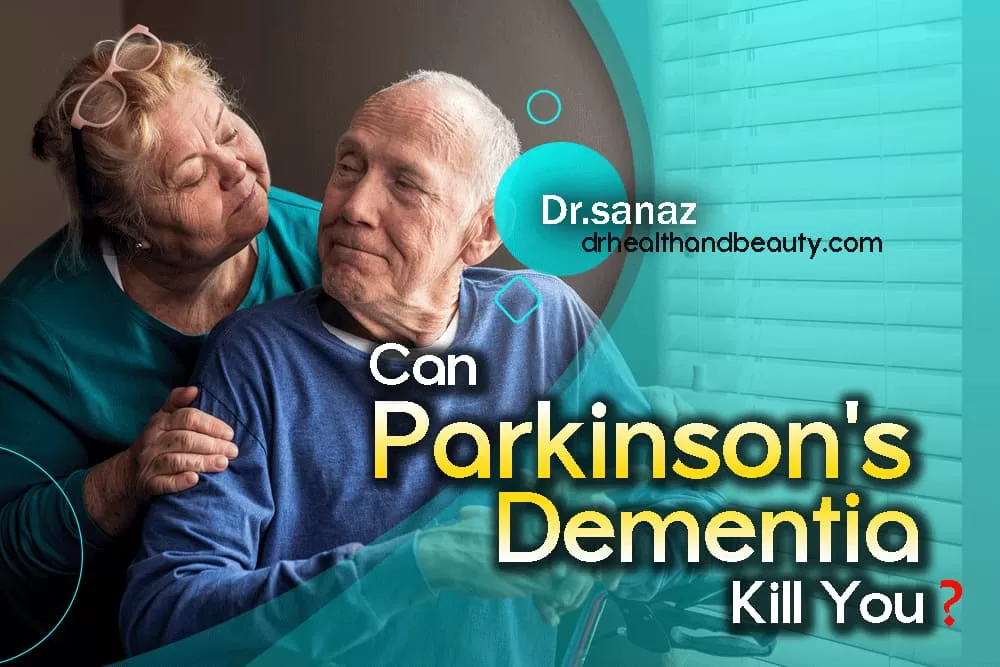
Can Parkinson's Dementia Kill You?
Parkinson’s disease is a progressive neurological disorder, and the first symptom is movement problems. Smooth and coordinated movements of body muscles are made possible by dopamine, a substance in the brain. Dopamine is produced in a part of the brain called the substantia nigra.
In Parkinson’s, the cells of the substantia nigra begin to die. When this happens, dopamine levels decrease. When dopamine levels drop by 60 to 80 percent, Parkinson’s symptoms appear.
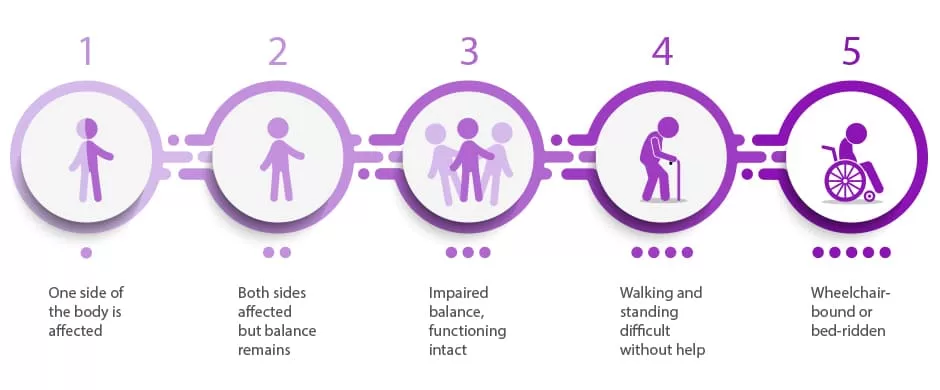
What symptoms should I look out for in Parkinson’s Dementia?
Some early symptoms of Parkinson’s disease dementia can begin several years before movement problems develop. These early symptoms include:
- Reduced ability to smell (anosmia)
- constipation
- Shrinking and compressing handwriting
- voice change
- bent over
The four main movement problems seen are:
- Tremor (shaking that occurs at rest)
- Slowing down movements
- Stiffness of arms, legs and trunk
- Balance problems and tendency to fall
Secondary symptoms include:
- Emotionless facial expression
- Desire to stop when walking
- Muffled speech and low volume
- Decreased blinking and swallowing
- The desire to lean back
- Reduction of swinging of the arm while walking
- Parkinsonian gait
Other associated symptoms may include:
- White or yellow flakes on the oily parts of the skin, which is known as seborrheic dermatitis
- Increased risk of melanoma, a severe type of skin cancer
- Sleep disturbances, including vivid dreams, talking and moving during sleep
- depression
- anxiety
- illusions
- Psychosis
- Attention and memory problems
- The problem in visual-visual relations
Early symptoms of Parkinson’s disease may go unnoticed. The body may be trying to warn you about a movement disorder with

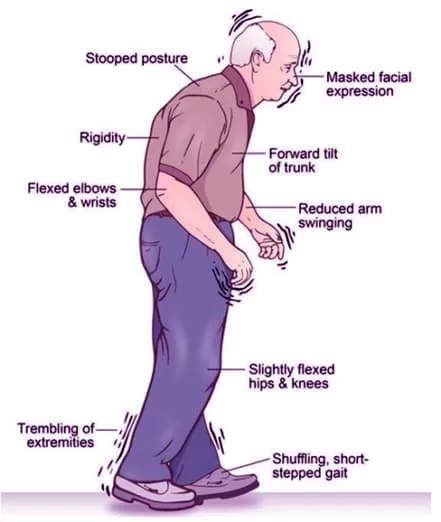
What causes Parkinson’s Disease and Parkinsonism-related dementia?
The exact cause of Parkinson’s is unknown. Both genetic and environmental factors may play a role. Some scientists believe that viruses can also cause Parkinson’s.
Low levels of dopamine and norepinephrine, a substance that regulates dopamine, are associated with Parkinson’s.
Abnormal proteins called Lewy bodies have also been found in the brains of people with Parkinson’s. Scientists do not know what role, if any, Lewy bodies play in the development of Parkinson’s.
While there is no known cause, research has identified groups of people who are more likely to develop the condition, including:
- Gender- Men are one and a half times more likely to develop Parkinson’s disease than women.
- race–According to reputable research, the prevalence of Parkinson’s disease is higher in white people than in. black or Asian people.- Geographical location may be one of the reasons for the higher risk.
- Age– Cognitive impairment in Parkinson’s disease usually appears between the ages of 50 and 60. It only occurs in about four percent of cases before age 40.
- family history– People whose close family members have Parkinson’s disease are more susceptible to the disease.
- Poisons – Exposure to certain toxins may increase the risk of developing Parkinson’s disease.
- Head injury-People who experience head injuries may be more likely to develop Parkinson’s disease.
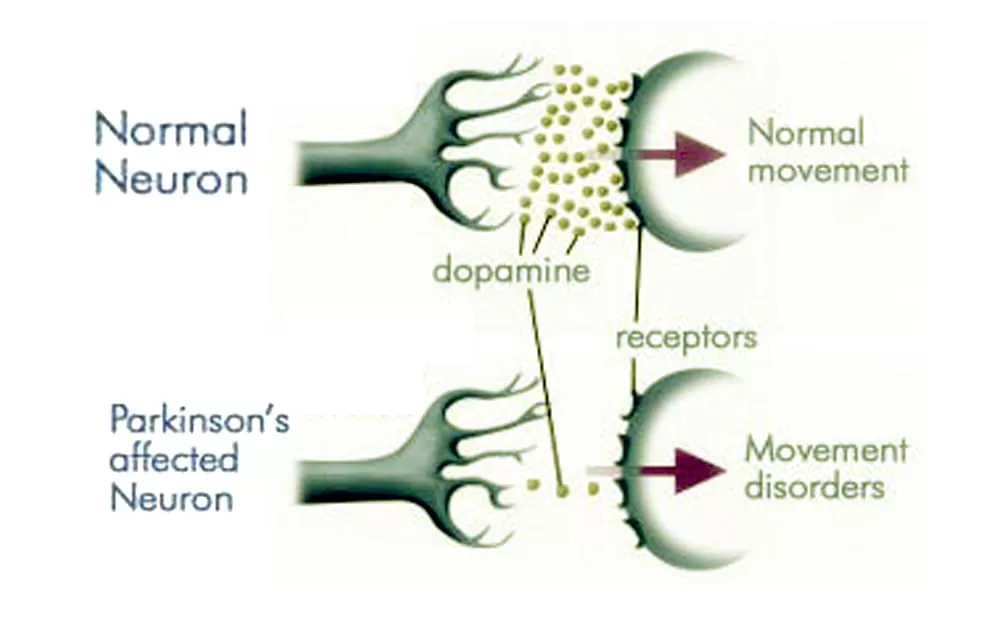
What are the available treatments for Parkinson’s dementia?
Treatment for Parkinson’s disease cognitive disorder depends on a combination of the following:
- changing lifestyle
- medicine
- therapy
- Adequate rest,
- exercise and
- balanced diet
are important.
- Speech therapy
- occupational therapy,
- and physical therapy can also help improve communication and self-care.
In almost all cases, medication is needed to help control the various physical and mental health symptoms associated with the disease.
Surgical interventions are reserved for people who do not respond to medication, therapy and lifestyle changes.
Two primary types of surgery are used to treat Parkinson’s disease:
- Deep brain stimulation
During deep brain stimulation (DBS), surgeons implant electrodes in specific brain areas. A generator attached to the electrodes sends pulses to help relieve symptoms.
- Pump treatment
In January 2015, the US Food and Drug Administration (FDA) approved a pump therapy called Duopa. This pump delivers a combination of levodopa and carbidopa. To use the pump, the doctor must operate to place the pump near the small intestine.
How is Parkinson’s Dementia diagnosed?
There is no specific test to diagnose dementia with features of Parkinson’s disease. Diagnosis is based on medical history, physical and neurological examination, as well as an examination of signs and symptoms.
Imaging tests, such as a CAT scan or MRI, may be used to rule out other diseases. A dopamine transporter (DAT) scan may also be used. Although these tests do not confirm Parkinson’s disease, they can help rule out other conditions and help your doctor make a diagnosis.
What is the prognosis for someone with Parkinson’s Dementia?
Parkinson’s complications can greatly reduce the quality of life and prognosis. For example, people with Parkinson’s can experience dangerous falls and blood clots in the lungs and legs. These complications can be fatal. Appropriate treatment improves prognosis and increases life expectancy.
You may not be able to slow down the progression of Parkinson’s, but you can work to overcome obstacles and complications to have a better quality of life for a long time.
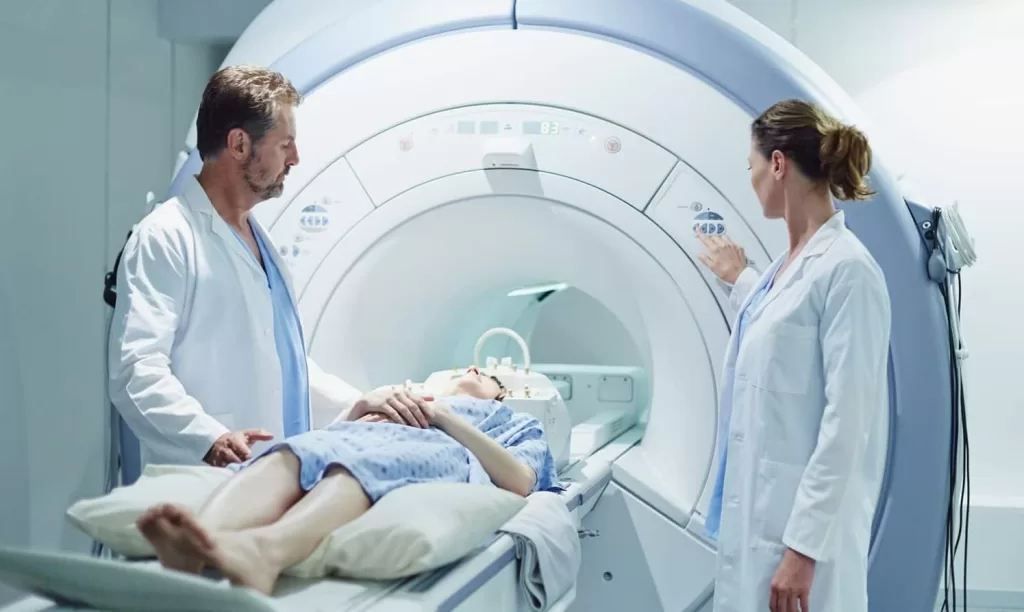
Can Parkinson’s Dementia Kill You?
Parkinson’s disease is not fatal. However, the complications associated with Parkinson’s can shorten the lifespan of people diagnosed with the disease.
Having Parkinson’s increases your risk of developing potentially life-threatening complications, such as experiencing the following:
- falling down
- blood clotting
- Lung infections
- Obstruction in the lungs
These complications can cause serious health problems. They can even be fatal.
It is not known how much Parkinson’s shortens life expectancy. One study examined the 6-year survival rates of nearly 140,000 people with Parkinson’s. In this 6-year period, 64% of people with Parkinson’s died.
Additionally, the study found that 70 percent of the subjects in the study had been diagnosed with Parkinson’s disease dementia. Those diagnosed with memory impairment had a lower survival rate.
What are the risk factors for Parkinson’s Dementia?
Can I live a normal life with Parkinson’s Dementia?
Parkinson’s is a progressive disease, meaning symptoms usually worsen over time.
You may experience symptoms such as:
- Muscle stiffness
- shiver
- Changes in facial expressions
- shaking
Movements are significantly slower, which slows down activities. Balance issues also become more critical, so falls are more common.
You will need a walker or assistive device to stand in more advanced stages.
Reactions and muscle movements are also significantly slowed down. Living alone can be unsafe and possibly dangerous.
In the most advanced stage, severe symptoms require round-the-clock assistance. Standing will be difficult and maybe not impossible. A wheelchair will most likely be required.
Also, at this stage, people with Parkinson’s may experience confusion, delusions, and hallucinations. These complications of the disease can start in the later stages.
Parkinson’s dementia is one of the complications of Parkinson’s disease. It causes people to face problems in reasoning, thinking and problem-solving. This problem is quite common – 50 to 80 percent of people with Parkinson’s experience some degree of dementia.
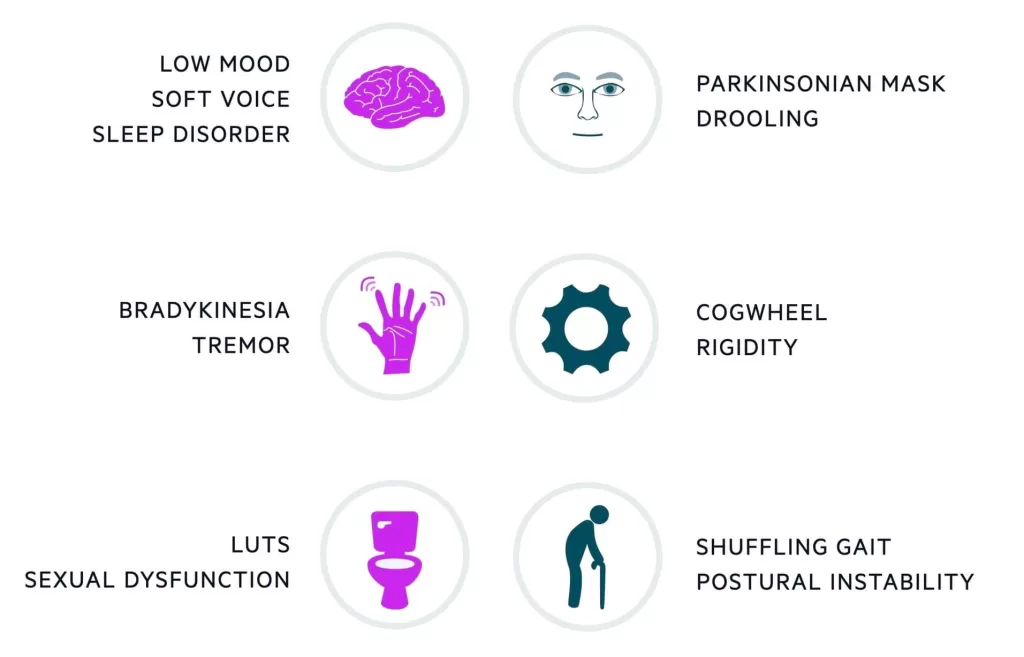
Symptoms of Parkinson’s disease dementia include:
- depression
- sleep disorders
- illusions
- confusion
- Mood swings
- Tongue tie
- Change in appetite
- Changes in energy levels
Parkinson’s disease destroys chemical receptor cells in the brain. Over time, this can lead to dramatic changes, symptoms, and complications.
Some people are more likely to develop Parkinson’s dementia.
Risk factors for this disease include:
- Gender Men are more affected by it.
- Age. The risk increases with age.
- You were existing cognitive impairment. If you had memory and mood problems before you were diagnosed with Parkinson’s, you may be at a higher risk of dementia.
- Severe symptoms of Parkinson’s. If you have a severe movement disorder, such as muscle stiffness and trouble walking, you may be more at risk of Parkinson’s dementia.
Currently, there is no cure for Parkinson’s disease dementia. Instead, the doctor focuses on treating other symptoms. Sometimes medications used for other types of dementia can be helpful.
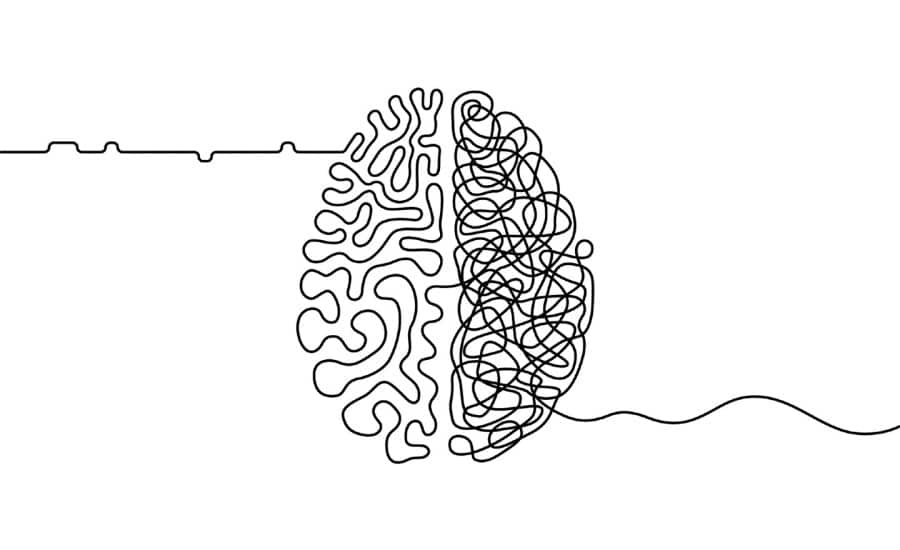
How can I prevent or slow the progression of Parkinson’s Disease and Parkinson’s Dementia?
Doctors and researchers do not know what causes Parkinson’s. They are also trying to understand why it progresses differently in each person. That is why it is unclear how to prevent this disease.
Every year, researchers investigate what causes Parkinson’s to find out what can be done to prevent it. Recent research suggests that lifestyle factors—such as physical activity and an antioxidant-rich diet—may have a protective effect.
If you have a family history of Parkinson’s disease, you may consider genetic testing. Specific genes are associated with Parkinson’s. But it is essential to know that having these gene mutations does not mean you will get this disease.
Talk to your doctor about the risks and benefits of genetic testing.
How can I support someone with Parkinson’s dementia?
Communicating with dementia patients can be challenging and may test your patience. Consequently, learning how to deal with communication difficulties when interacting with your loved one is essential.
A quiet voice can calm them down. So try to speak in the most positive way possible. Communicating with people with dementia requires patience because it can be mentally exhausting. Although you may feel anger, frustration, fear, or anger, do not worry. All these feelings are entirely normal. If you feel overwhelmed, try to find a support group. You should also be your best self with your loved one.
Conclusion
Experts are still not sure what causes Parkinson’s. It is a lifelong disease that can be controlled with lifestyle changes and medical treatments. If you are experiencing symptoms of Parkinson’s or have been diagnosed with it and are looking for new ways to manage it, talk to your doctor.
Share in :
Explore more

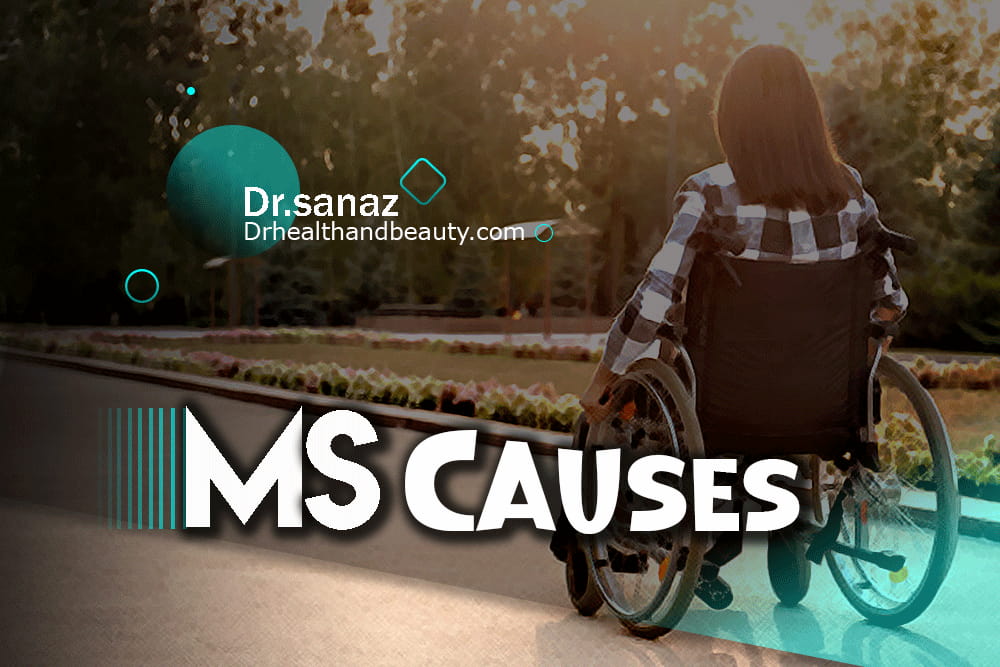
What Causes MS? Unveiling The Mystery – Drhealthandbeauty

